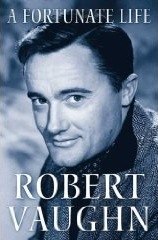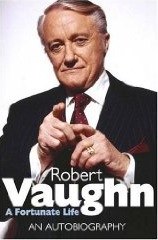A FORTUNATE LIFE
By Robert Vaughn
St. Martin’s Press (2008). 305 pages. $25.95
Reviewed by Craig Henderson
A few decades ago, actor Robert Vaughn announced plans to write his memoirs. The result finally has arrived in book stores as A Fortunate Life, a thoroughly entertaining yet oddly selective and incomplete story of Vaughn’s life and career.
At one time the book’s title was said to be Flying Solo, a nod to Vaughn’s most famous role as Napoleon Solo, hero of The Man From U.N.C.L.E. The final title reflects Vaughn’s belief that “a modest amount of looks and talent and more than a modicum of serendipity” have given him a half-century of fame and fortune, a refreshingly self-effacing view these days. But if Vaughn is a bit too modest about his own abilities, he doesn’t hesitate to praise and damn the many other famous names he’s encountered over the years — not only in Hollywood of the 1950s and 1960s, but extending back into his Midwest childhood, when his theatrical family brought him face to face with figures as varied as John Barrymore, Zasu Pitts and Hubert Humphrey.
Vaughn’s boyhood was far from typical, but of course things pick up considerably with his arrival in Los Angeles in 1952, where he pals around with the equally young and unknown Johnny Carson (who knew?), befriends such future stars as Jack Nicholson and James Coburn, and dates Natalie Wood after being initiated into Hollywood’s sexual mores by the wanton daughter of ancient vaudeville and film comic Bert Wheeler.
When the narrative arrives, somewhat erratically, in the late 50s and early 60s (some chapters veer off on various topics instead of sticking to chronological events), many readers will find themselves in familiar territory. The Man From U.N.C.L.E. was such a sensation that Vaughn and co-star David McCallum had their entire lives endlessly examined, rehashed and dissected by movie magazines and gossip columns for most of the show’s run, and U.N.C.L.E. fans couldn’t help absorbing it all whether or not they were truly interested. Vaughn’s first starring role in the embarrassing “Teenage Caveman,” his breakthrough and Oscar nomination for “The Young Philadelphians,” the success of “The Magnificent Seven,” followed by The Lieutenant and then U.N.C.L.E., is all here. His long relationship with Joyce Jameson, his obsession with “Hamlet,” his interest in vitamins and health food when that was still considered eccentric, his trip to Moscow during U.N.C.L.E.’s first season, the alleged feud with McCallum, covered as well. Vaughn’s friendship with Bobby Kennedy and his family, his early opposition to the Vietnam War, debating the war with William F. Buckley on Buckley’s Firing Line program, Joan O’Brien’s suicide attempt at Vaughn’s house — all here and all fascinating, if somehow not quite as absorbing as readers might have expected from Vaughn’s firsthand account.
However — and this is the big however — U.N.C.L.E. fans looking for Vaughn’s unique inside perspective on the show are in for a disappointment. His single chapter about the U.N.C.L.E. craze and part of another chapter recounting the show’s sudden fall reveal precious little that followers of the series don’t know already from many other sources — most recently and most similarly put in Vaughn’s own interviews recorded for the U.N.C.L.E. DVD set. Even more disappointing is the discovery that many of his other comments about the series are obviously taken from Jon Heitland’s The Man From U.N.C.L.E. Book, in passages that sometimes are confusingly and misleadingly reworded (giving, for example, the impression that such series as The Dick Van Dyke Show, The Avengers, I Dream of Jeannie and The Addams Family actually wrote and broadcast spoofs of U.N.C.L.E. when all they did — as Heitland made perfectly clear — was include one joke or a play on the title, i.e., Van Dyke’s “The Man from My Uncle”).
Vaughn’s opinions of U.N.C.L.E. are a bit inconsistent. He dismisses the plots as mostly “gimcrack affairs,” then praises them as “clever, bordering on brilliantly imaginative.” The pilot is “dated and clunky” but MGM’s extensive back lots gave the show “a cosmopolitan look that was very convincing.”
It also seems odd that Vaughn can’t describe the show’s basic format. U.N.C.L.E.’s famed “innocent,” the average person suddenly swept out of a humdrum life into an exotic adventure, was “an implausible plot device” that Vaughn was happy to see “dropped after a few episodes.” But that did not happen, and just a few pages later Vaughn outlines the essential elements of the series as including the weekly assistance of “an ordinary person who would play a crucial role” in the story. He then claims there were typically two leading ladies every week, “one for Illya, one for Napoleon,” when it actually was a rare episode that included a girl for both. He also indicates that Solo and Illya went off in different directions every week and only met again at the climax, something that did happen sometimes but was hardly the typical approach.
Vaughn runs through a list of ridiculous actions that ruined the show during its comedic third season, but claims they occurred in the second season (and again they’re all cribbed from Heitland). U.N.C.L.E. creator Sam Rolfe is mentioned twice in the entire book, almost incidentally as the pilot script’s writer, and then when Vaughn discusses the end of the show (giving Rolfe just praise for the high quality of the first season). Executive producer Norman Felton rates only a few more mentions. And it’s particularly annoying to see Vaughn repeatedly write Thrush as “T.H.R.U.S.H.,” an egregious misspelling previously used only by a few very young and very ignorant writers who know absolutely nothing about the show.
If all this sounds like fannish nitpicking, well, maybe it is to some extent. I do not want to imply that this book is not a worthy addition to any fan’s library. Vaughn is a more than capable writer who neatly captures the good old show biz days and the larger 1960s zeitgeist. But I honestly expected more and better. Vaughn has indicated that he put in years of thinking, planning and research before he started writing these memoirs. And he is hardly the typical nitwit actor. He spent much of his time during and after U.N.C.L.E.’s run pursuing a Ph.D. at the University of Southern California, and the book version of his thesis about McCarthy-era blacklisting, Only Victims, is meticulously researched and engagingly written.
But frankly, there were only two U.N.C.L.E. items in A Fortunate Life that really piqued my interest. Vaughn reveals that Janice Rule was originally cast as the ordinary housewife and mom in the pilot (the role he found to be “an implausible plot device”). But because she and Vaughn both preferred to be shot from their left sides, Vaughn managed to have her dropped and replaced by Patricia Crowley (who apparently cared less about camera angles and more about getting a good job).
Vaughn also addresses the question he’s surely been asked a thousand times now: Why didn’t he and McCallum try to do something about the appalling drop in quality during the show’s third season? His answer, in brief, is he wishes now they had tried, but they were young actors still enjoying the first flush of success and they did not exercise their star-power as they might have later. It’s also clear, however, that Vaughn thinks they were there to do their jobs, which was acting — another telling response about professional attitudes in the 1960s, in contrast to later years when flash-in-the-pan TV “stars” refused to return to work for a new season until their salaries were quintupled.
Post-U.N.C.L.E., Vaughn writes compellingly about his growing involvement in the anti-war and civil rights movements and his support of Sen. Robert F. Kennedy’s run for president. It’s fascinating to learn that ABC offered Vaughn the liberal position opposite conservative William F. Buckley in the network’s coverage of the 1968 political conventions, but Vaughn had to turn them down because he was committed to shooting “The Bridge at Remagen” in Czechoslovakia — which resulted in Gore Vidal teaming with Buckley and Vaughn being trapped behind the Iron Curtain when the Soviet Union invaded Czechoslovakia to crush the “Prague Spring” reform movement.
Vaughn’s relationship with Kennedy was such that he was aboard the train that carried Kennedy’s body from New York to Washington, D.C., for burial at Arlington National Cemetery, and again Vaughn writes movingly of those terrible days that no one who lived through them can forget. So it’s disheartening to learn that Vaughn has bought into a conspiracy theory surrounding his friend’s assassination and he devotes an entire chapter to expounding on that. I’ll resist the temptation to name the world-famous figure who allegedly orchestrated RFK’s murder so that other readers can be as flabbergasted as I was.
Vaughn has little to say about events after the late 1960s and early 1970s, which would seem to confirm reports that he’s planning a followup volume. His current British-made TV series Hustle goes almost unmentioned and his other series The Protectors and his later movies are nearly as neglected, rating only passing reference in a final chapter of anecdotes that he didn’t fit into earlier sections.
This last chapter is where Vaughn finally brings up “The Boston Terrier,” a project I’d decided he must have simply forgotten about. He surely has some interesting stories about working with Blake Edwards on not one but two “Boston Terrier” pilots, stories I hope will appear in the next volume. The fact is, if Vaughn had starred in a “Boston Terrier” series, he most likely would not have done The Man From U.N.C.L.E. Which means he would now be just another nearly forgotten actor instead of the iconic star of a TV landmark and the author of this engaging but sadly incomplete book.





